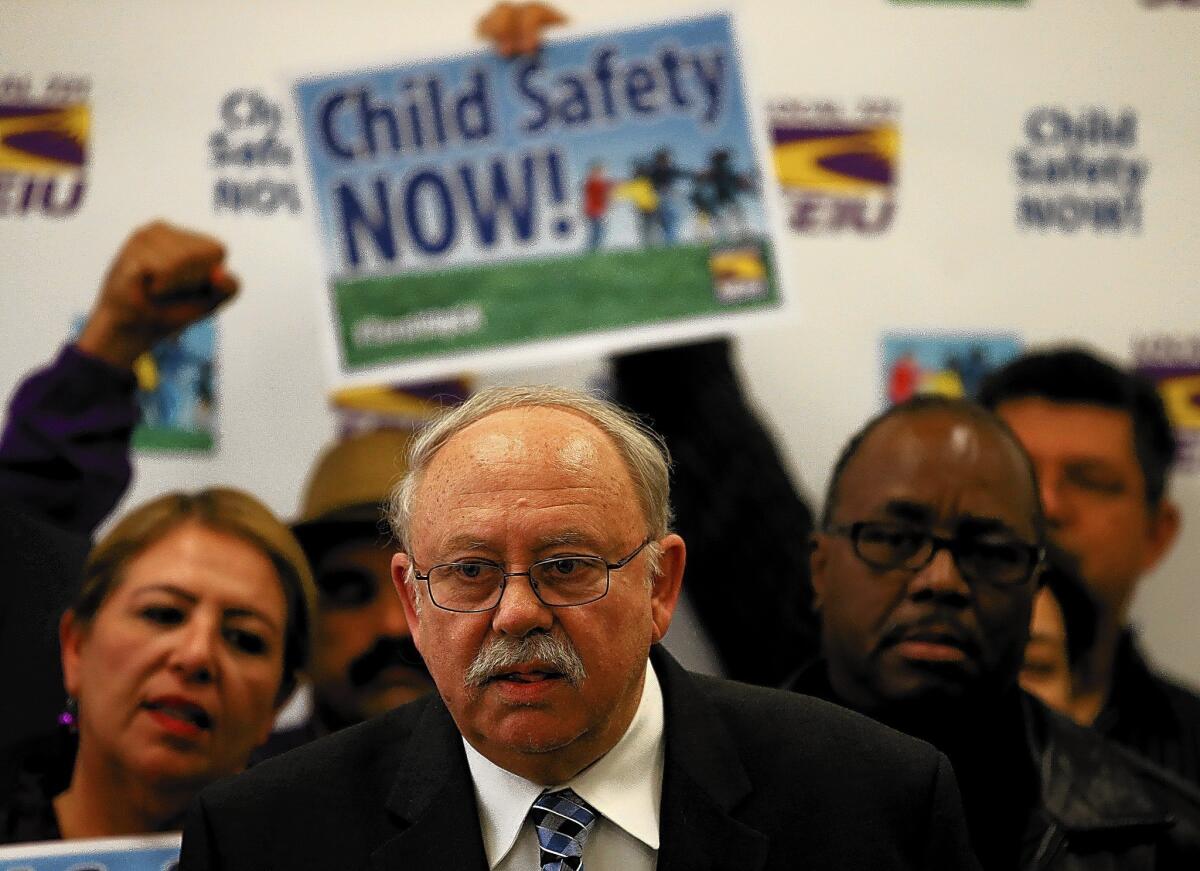Tentative deal reached between L.A. County and social workers union

- Share via
After a multi-day strike by social workers, Los Angeles County and its largest public employee union have tentatively reached an agreement that calls for the hiring of 450 child-welfare employees, reducing caseloads and increasing scheduling flexibility, officials announced Friday.
The deal leaves one remaining dispute: the timing of a 6% pay raise.
“Our social workers are in a much better place than before we went on strike, but the real important thing is the children of Los Angeles County who need their services are in a much better place,” said Bob Schoonover, president of Service Employees International Union Local 721. “This really was a strike over child safety. It was never about money.”
“This agreement provides for a way forward in providing the best services to the children and families of this county,” said county representative David Sommers.
The agreement, which must be ratified by union members — probably in January — and approved by the Board of Supervisors, calls for adding 450 social workers by Oct. 1, 2014, on top of the hiring that would normally take place because of attrition. County and union leaders will create a panel to study lowering caseloads, which are currently 31 cases per worker, although that number is routinely exceeded.
The union’s contract expired on Sept. 30, and thousands of workers walked off their jobs the following day to march in downtown Los Angeles. As negotiations stalled, the union’s actions escalated, with nearly two-thirds of social workers going on strike Dec. 5 — the first strike by county workers in more than a decade. Pickets appeared outside the offices of Department of Children and Family Services, the Board of Supervisors and the Hall of Administration. During a demonstration Tuesday, a handful of workers were arrested after sitting on the street and blocking traffic. The strike was put on hold Tuesday night, when the union agreed to go back to the bargaining table.
On Friday, a tentative deal also was reached with the Department of Public Social Services, where workers were unhappy about a proposed graveyard shift that did not come with extra pay. The county eliminated the proposal.
Union officials hope to resolve the timing of the raises next week. Both sides have tentatively agreed to a 6% raise that is expected to be given in 2% increments. SEIU leaders want the raises to be retroactive to the day their contract expired or have the final increment in 2015 be given two months earlier. The county has a long-standing policy against retroactivity, arguing that it is unfair to the other unions that settled their contracts on time.
Though the strike was short-lived, it affected the lives of families who have children in foster care and slowed DCFS’ ability to meet court-ordered deadlines, leading to a spike in the number of citations against the county.
The department brought in hundreds of managers to fill in while the majority of social workers were on strike. But the managers were focused on “critical services,” such as manning the child-abuse hotline and handling investigations requiring an immediate response. In the meantime, some families and advocates said the strike resulted in communication breakdowns and delays in visitations and dependency hearings.
The department received 11 court sanctions totaling $2,300 for late reports during the strike. Spokesman Armand Montiel said it typically takes a month for the agency to receive that many sanctions, although he could not say how many of the delays were strike-related.
Dependency court Supervising Judge Margaret S. Henry said some judicial officers at the court had as many as four or five hearings a day continued that they believed to be strike-related, on top of the one or two continuances they would see on a typical day. The influx means that cases that were set for trial likely will not be heard until February at the earliest, leaving families in limbo over the holidays.
Meanwhile, the number of filings to detain children dropped off during the strike, from the typical 35 to 40 cases a day to about 13, she said.
“You do wonder, are there cases out there where children have been severely mistreated or neglected that they didn’t file on, or is it possible that they don’t need to be filing on so many cases?” she said.
Henry said that although the strike’s timing so near the Christmas holiday was bad, she agrees the county needs more social workers.
More to Read
Sign up for Essential California
The most important California stories and recommendations in your inbox every morning.
You may occasionally receive promotional content from the Los Angeles Times.












